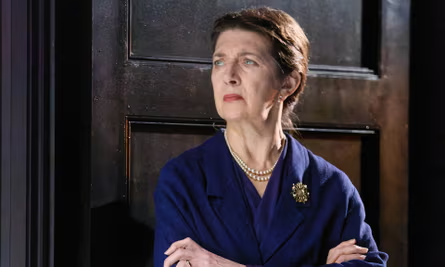Hampstead Theatre, London – until 12th October 2024
Reviewed Celia Armand Smith
4****
It’s 1956 and Cecilia Payne-Gaposchkin is at the top of her game. An eminent astronomer, she should be a shoo-in for the candidacy of Chair of Astronomy at Harvard, and yet the group of men deciding have concerns – mainly that she is a woman, and that she might be a communist sympathiser. Within minutes of the beginning of Stella Feehily’s new play “The Lightest Element”, we are swiftly transported back into the 1920s, and having swapped Cambridge UK for Cambridge USA, Cecilia Payne (as she was back then) has discovered that the stars and the sun aren’t made of iron as her male peers thought, but are made from hydrogen and helium. The leading scientist of the time, Henry Norris Russell, reads her thesis, dismisses it suggesting she make changes, and then years later releases the theory as his own. Back to the 50s, and Payne-Gaposchkin is married to a Russian, and under scrutiny from the House Un-American Activities Committee. Student journalist Sally is enlisted by her terrible editor boyfriend to profile her and dig up some dirt on her political leanings. However, once these women meet and the Polish vodka is cracked open, the truths of the universe are spilled, and it is up to them to write their own story.
Under Alice Hamilton’s direction, the cast delivers a series of strong performances, bringing depth, authenticity and humour to their roles. Maureen Beattie’s Payne-Gaposchkin is witty and kind, and she deftly navigates the world of astronomy and science as if she was a professor herself. Beattie is superbly supported by Annie Kingsnorth as Sally the sparky student journalist, and Rina Mahoney as Cecilia’s caring and watchful assistant.
Sarah Beaton’s curved set is reminiscent of an observatory or planetarium making for a more immersive experience, and the revolving stage is a clever solution for moving the action from cafes to offices to boardrooms. The thought provoking script and gentle humour mean that the 95 minutes fly by, and I am left wanting to know everything about Payne-Gaposchkin or Mrs G as she was affectionately known.
“The Lightest Element” is a captivating piece of theatre that centres a fiercely bright and engaging woman in man’s world. The play ends where it begins, in an auditorium with an older Payne-Gaposchkin delivering a keynote speech to young scientists. She lists prominent women in science, many of whom have gone un-celebrated, and encouraging the young women to make themselves heard. However it is a quote from Simon Chandler’s Professor Fred Whipple that stays with me longer after the play has ended, “Stop listening to dead men”. Words to live by.

